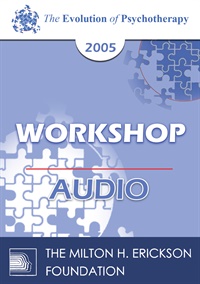EP05 Workshop 18 - The Family vs. Addiction - Claudia Black, PhD
- Average Rating:
- Not yet rated
- Topic Areas:
- Workshops | Addiction | Family Therapy | Family Systems | Psychotherapy
- Categories:
- Evolution of Psychotherapy | Evolution of Psychotherapy 2005 | Pioneers in Couples and Family Therapy
- Faculty:
- Claudia Black, PhD
- Duration:
- 2 Hours 38 Minutes
- Format:
- Audio Only
- Original Program Date:
- Dec 08, 2005
- License:
- Never Expires.
Description
Description: Beginning with a historical view of addiction in the family, Dr. Black will identify the many challenges of working family systems. The workshop will include a variety of intervening strategies to engage family members as a part of the recovery process.
Educational Objectives:
- To list three predominant dynamics of the legacy of addiction within a family system.
- To describe specific strategies of intervention in working with families affected by addiction.
*Sessions may be edited for content and to preserve confidentiality*
Outline:
Welcome and Overview
-
Session divided into two parts, with focus on practical family-based strategies for addiction and trauma recovery.
Addiction, Trauma, and Family Impact
-
Addiction often coexists with trauma, creating long-term harm in families.
-
Children in addicted homes face chronic stress, abuse, and emotional abandonment.
-
High risks include anxiety, depression, school problems, and higher healthcare usage.
-
Addictive patterns often repeat across generations.
Personal Stories and Case Examples
-
Alice: Raised in an abusive home, developed sexual and substance addictions early.
-
William: Learned rage from his father; used anger and alcohol to cope with shame.
-
Jan: Grew up amid violence, lost her mother to alcoholism, struggled with addiction.
-
Jake: Faced family addiction and trauma, turned to drugs after family breakdown.
-
Kay: Alcoholic and compulsive gambler, using addiction to manage deep trauma.
Addiction in Historical and Social Context
-
Addiction in families dates back over a century, with long-documented impacts on children.
-
National traumas (e.g., 9/11, hurricanes) compound personal and familial trauma.
-
Early intervention and systemic support are critical.
Understanding Family Roles and Rules
-
Dysfunctional family rules (e.g., "don’t talk") suppress emotions and reinforce secrecy.
-
Children adopt roles like hero, scapegoat, or lost child to survive.
-
These roles often carry into adulthood, shaping relationships and addictive patterns.
Forms of Abuse in Addicted Families
-
Abuse includes physical, emotional, verbal, sexual, and neglect.
-
Emotional abandonment creates deep, lasting wounds.
-
Abuse often goes unrecognized due to normalization within the family system.
Control, Enabling, and Family Dynamics
-
Family members often enable addiction through control and denial.
-
Enabling can take sweet, silent, or aggressive forms.
-
Grieving the loss of control is a key part of recovery.
-
Balance is needed between letting go and remaining engaged ("the concept of some").
Therapeutic Approaches and Strategies
-
Effective treatment addresses affective, cognitive, behavioral, and spiritual needs.
-
Use structured exercises to identify enabling, control, and unhealed pain.
-
Help families practice tough love and recognize personal powerlessness.
-
Include both education and emotional processing in family sessions.
Addiction as Coping and Reinforcement
-
Alcohol and drugs offer temporary escape from emotional burdens.
-
Substances can become tools for emotional regulation, creating dependency.
-
Psychological reinforcement (e.g., relief, empowerment) contributes to continued use.
Relationships and Repeating the Legacy
-
Many repeat childhood addiction dynamics in adult relationships.
-
Patterns may not be obvious at first; dysfunction escalates over time.
-
Emphasis on awareness and breaking relational cycles is critical.
Family Involvement in Recovery
-
Family therapy is essential—not just for education, but for healing.
-
Recovery plans should include goals for each family member.
-
Encourage commitment to change, rather than waiting for invitations to participate.
Credits
Handouts
| Timestamped Transcript (1.1 MB) | 30 Pages | Available after Purchase |
| Timestamped Transcript (1.1 MB) | 27 Pages | Available after Purchase |
| Ericksonian Learning Snapshot (256.9 KB) | 2 Pages | Available after Purchase |
Faculty

Claudia Black, PhD Related Seminars and Products
Claudia Black, Ph.D., is internationally recognized for her pioneering and cutting-edge work with family systems and addictive disorders. Her work with children impacted by drug and alcohol addiction in the late 1970s fueled the advancement of the codependency and developmental trauma fields. Dr. Black’s passion to help young adults overcome obstacles and strengthen families built the foundation of the Claudia Black Young Adult Center. Not only is Dr. Black the clinical architect of this groundbreaking treatment program, she is also actively involved with the treatment team, patients, and their families.
Claudia is the author of It Will Never Happen To Me, Changing Course, My Dad Loves Me, My Dad Has A Disease, Repeat After Me, It's Never Too Late To Have A Happy Childhood, Relapse Toolkit, A Hole in the Sidewalk, Depression Strategies, Straight Talk, The Stamp Game, Family Strategies, Anger Strategies, Deceived: Facing Sexual Betrayal, Lies and Secrets, The Truth Begins With Youand her newest title, Intimate Treason: Healing the Trauma for Partners Confronting Sex Addiction. She has produced seven audio CDs addressing issues of addiction and recovery. They are A Time for Healing, Putting the Past Behind, Triggers, Emotional Baggage, Trauma in the Addicted Family, Imageries and Letting Go Imageries. She also has over 20 DVDs for professionals to use working with families and clients.


